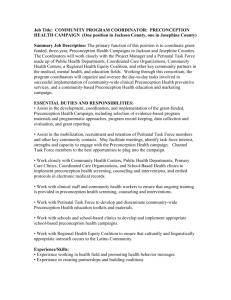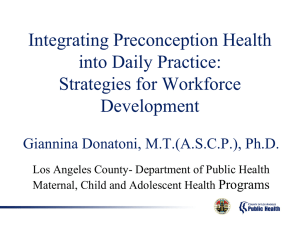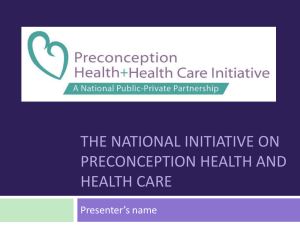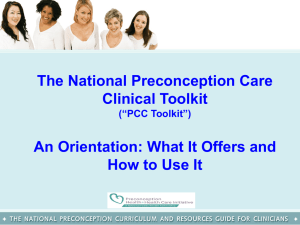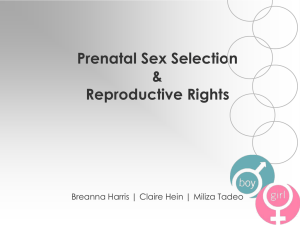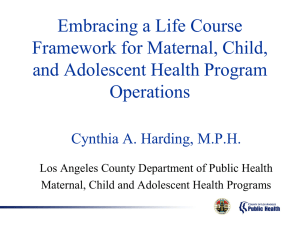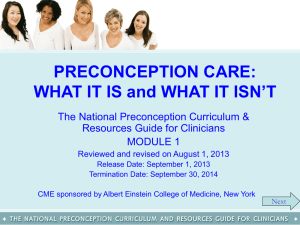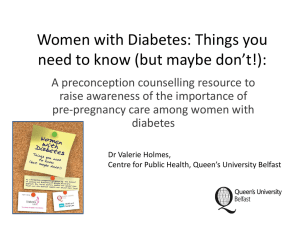Dia 1 - European forum for primary care
advertisement
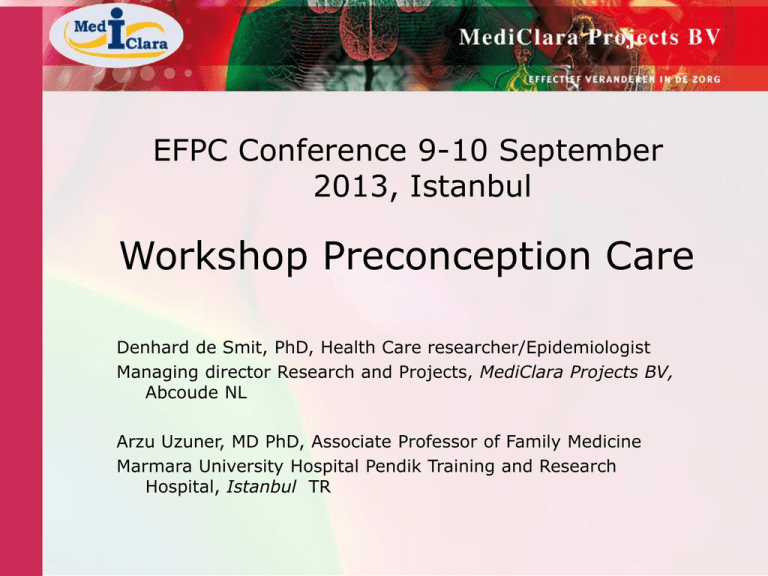
EFPC Conference 9-10 September 2013, Istanbul Workshop Preconception Care Denhard de Smit, PhD, Health Care researcher/Epidemiologist Managing director Research and Projects, MediClara Projects BV, Abcoude NL Arzu Uzuner, MD PhD, Associate Professor of Family Medicine Marmara University Hospital Pendik Training and Research Hospital, Istanbul TR 1. Introduction Introduction Today’s programme 1. 2. 3. 5. Introduction 01-05 a. b. WG WG Agenda Today’s participants Preconception care: headlines 06-15 a. b. c. DS DS DS The health issues of interest Involvement of PC, PH and specialist care Policy development: examples and events Primary care involvement in preconception care 16-55 a. Objectives for primary care b. Opportunities and requirements c. Role of EFPC-network 16-30 31-45 46-55 Summary and closing 56-60 Introduction Today’s participants Who is who? Name, country Profession, current position and experience Main reason to attend this workshop? 2. Preconception care: headlines Preconception care: headlines General definition (1) “Preconception care is defined in this advisory report as the entire raft of measures to promote the health of the mother-to-be and her child. If they are to be effective, these measures should preferably be undertaken prior to conception. Preconception care is therefore multidisciplinary, encompassing lifestyle (including food, drink, tobacco and other recreational drugs), working conditions, illness, medication and genetic factors.” Health Council of the Netherlands. Preconception care: a good beginning. The Hague: Health Council of the Netherlands, 2007; publication no. 2007/19. Preconception care: An headlines overwiew General definition (2) Modified CDC definition by consensus: “A set of interventions and/or programme that aim to identify and enable informed decision-making to modify biomedical, behavioural, and (psycho) social risks to parental health and the health of their future child, through counselling, prevention and management, emphasizing those factors that must be acted on before conception or early in pregnancy to have maximal impact and/or choice.” Dutch consensus meeting on Preconception Care. January/April 2012. The Netherlands. [To be published]. Preconception care: headlines a. The health issues of interest Preconception care: An headlines overwiew The health issues … (1) From the Dutch health council report Food, alcohol, tobacco and other recreational drugs • Folic Acid suppletion (general population 0,4 mg; increased risk 4,0 mg) • Vitamin D suppletion (if needed) • Vitamin A (prevent too high intake) • Alcohol (fertility, FAS) • Tobacco (fertility, birth weight) Working conditions • Chemical agents (pesticides, solvents, …) • Stress Preconception care: An headlines overwiew The health issues … (2) Illness and medication • Infectious diseases (Vaccination, treatment and prevention) • Chronic diseases ilke diabetes, epilepsy, depression (optimization of medication) • Teratogenic drugs (pregnancy prevention) • Obesity, anorexia and maternal/paternal age Genetic factors • Extend range of options in the case of unfavourable genetic background – Known increased risks (genetic diagnosis/counselling done previously) – Indications from family history – Carrier screening (cystic fibrosis, hemoglobinopathies) Preconception care: An headlines overwiew The health issues … (3) Additional issues that can/should be dealt with in the preconception period Personal preparation for pregnancy? • Prenatal screening options (Down screening, 20-wk ultrasound) Medical preparation for pregnancy • Obstetric history • Increased risks from pre-existing disease Timely uptake of prenatal care Preconception care: headlines b. Involvement of PC, PH and specialist care Preconception care: An headlines overwiew The involvement of primary care, public health and specialist care “Preconception care has various, complementary forms. Some are aimed at individual parents-tobe, while others may, for example, collectively target all women of child-bearing age”. and “ … the various components of the programme … should not be provided as separate elements but as an integrated healthcare concept.” Preconception care: An headlines overwiew The involvement of … (1) Care sectors • • • • • Folic acid PH Genetic risk assessment PC, SC “Lifestyle” PH, PC, SC Preconception consultation PC, SC Promotion of preconception consultation PH, PC An overwiew The involvement of … (2) Primary care workers • GP’s: (promotion of) preconception consultation and follow-up as appropriate • Midwives, nurses: preconception consultation and follow-up as appropriate • Pharmacists: FA-education, medication surveillance, promotion of preconception consultation An overwiew The involvement of … (3) An overwiew Prevalences of risks/disorders NTD’s • Affected pregnancies: ~1 in 1000 • In Europe ~4.500 cases/year • 70% TOP Cystic fibrosis • Cases: 1 in 3600 newborns • Couples at risk: 1 in 900 Medication use first trimester • 40 in 100 >= 1 prescription Developments: …. a. Developments: implementation and events Developments: An overwiew …. Developments: implementation and events Existing implementation in Hungary Programme development 1984-1994 Current implementation by specialized nurses Developments in The Netherlands Ministry of Health reply to Health Council report (2007) Coordination of resources for public information (RIVM) Major role for midwives in preconception consultation? GP- Standard available (2011) Implementation in Italy Active implementation e.g. in Veneto region (2010) Developments: An overwiew …. Developments …(2) Scientific events European congresses on Preconception Health and Prevention of Birth defects (Budapest, 2008; Brussels, 2010; Rotterdam, 2012; Budapest, 2014) Preparing for Life Initiative International initiative group 2010 Alignment with WHO objectives and strategies Global ambitions Developments: …. PfL Mission The overall objective of Preparing for Life is to initiate an international awareness and prevention program to reduce common known risks of adverse health effects for the parents-to-be, the fetus or neonate by addressing women and men at child-bearing age, in both developed and developing countries. This objective follows the 4th and 5th UN- millennium development goal to "reduce child mortality by two/thirds'' and “reduce the maternal mortality ratio by two three quarters”. www.preparingforlife.net Primary care involvement 3. Primary care involvement in preconception care in Europe Primary care involvement a. Objectives for primary care Primary care involvement b. Opportunities and requirements Primary care involvement c. Role of EFPC-network The End Thank you for your participation! arzuuzuner@gmail.com djedesmit@mediclara.nl
